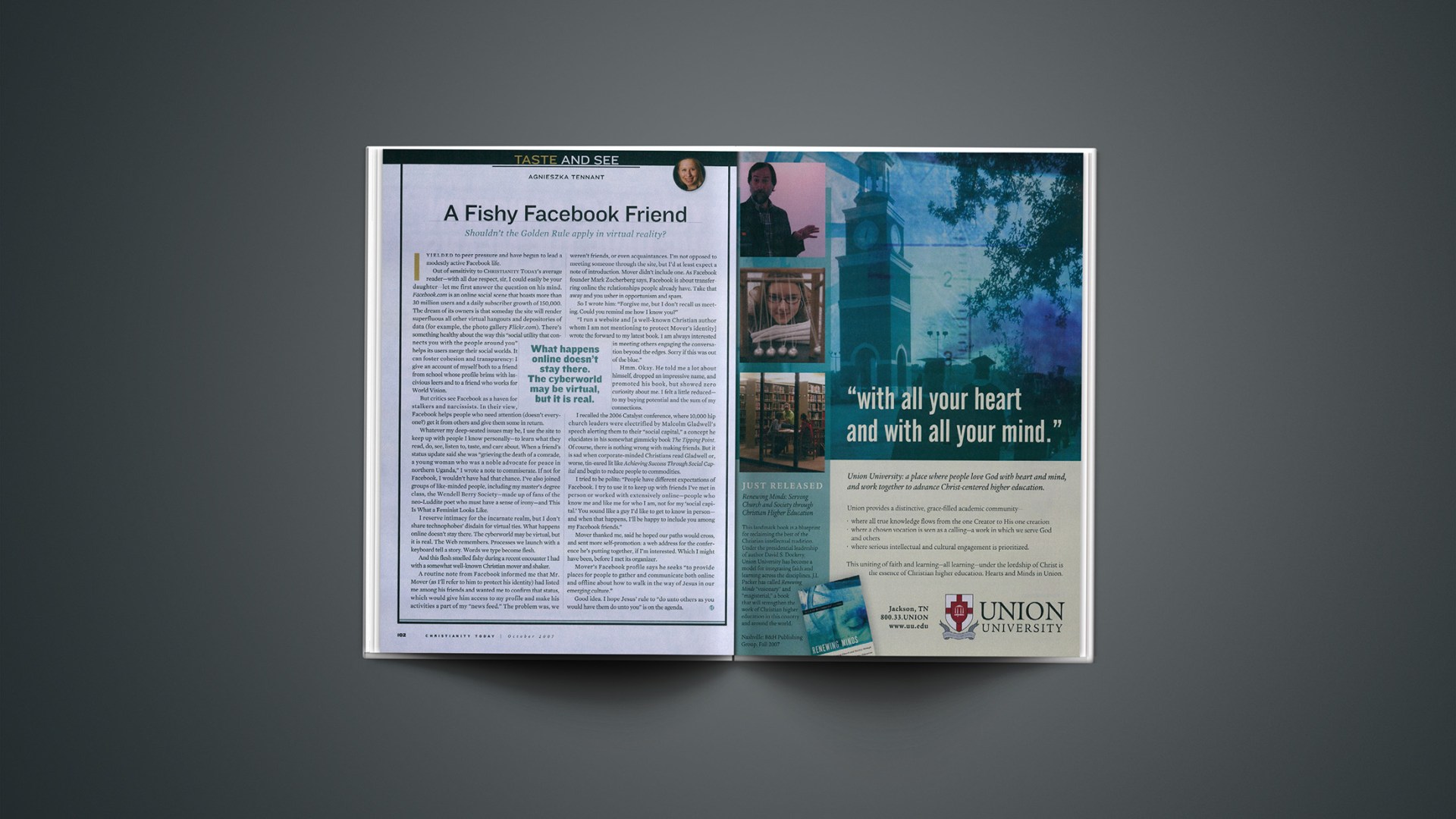I yielded to peer pressure and have begun to lead a modestly active Facebook life.
Out of sensitivity to Christianity Today‘s average reader—with all due respect, sir, I could easily be your daughter—let me first answer the question on his mind. Facebook.com is an online social scene that boasts more than 30 million users and a daily subscriber growth of 150,000. The dream of its owners is that someday the site will render superfluous all other virtual hangouts and depositories of data (for example, the photo gallery Flickr.com). There’s something healthy about the way this “social utility that connects you with the people around you” helps its users merge their social worlds. It can foster cohesion and transparency: I give an account of myself both to a friend from school whose profile brims with lascivious leers and to a friend who works for World Vision.
But critics see Facebook as a haven for stalkers and narcissists. In their view, Facebook helps people who need attention (doesn’t everyone?) get it from others and give them some in return.
Whatever my deep-seated issues may be, I use the site to keep up with people I know personally—to learn what they read, do, see, listen to, taste, and care about. When a friend’s status update said she was “grieving the death of a comrade, a young woman who was a noble advocate for peace in northern Uganda,” I wrote a note to commiserate. If not for Facebook, I wouldn’t have had that chance. I’ve also joined groups of like-minded people, including my master’s degree class, the Wendell Berry Society—made up of fans of the neo-Luddite poet who must have a sense of irony—and This Is What a Feminist Looks Like.
I reserve intimacy for the incarnate realm, but I don’t share technophobes’ disdain for virtual ties. What happens online doesn’t stay there. The cyberworld may be virtual, but it is real. The Web remembers. Processes we launch with a keyboard tell a story. Words we type become flesh.
And this flesh smelled fishy during a recent encounter I had with a somewhat well-known Christian mover and shaker.
A routine note from Facebook informed me that Mr. Mover (as I’ll refer to him to protect his identity) had listed me among his friends and wanted me to confirm that status, which would give him access to my profile and make his activities a part of my “news feed.” The problem was, we weren’t friends, or even acquaintances. I’m not opposed to meeting someone through the site, but I’d at least expect a note of introduction. Mover didn’t include one. As Facebook founder Mark Zucherberg says, Facebook is about transferring online the relationships people already have. Take that away and you usher in opportunism and spam.
So I wrote him: “Forgive me, but I don’t recall us meeting. Could you remind me how I know you?”
“I run a website and [a well-known Christian author whom I am not mentioning to protect Mover’s identity] wrote the forward to my latest book. I am always interested in meeting others engaging the conversation beyond the edges. Sorry if this was out of the blue.”
Hmm. Okay. He told me a lot about himself, dropped an impressive name, and promoted his book, but showed zero curiosity about me. I felt a little reduced—to my buying potential and the sum of my connections.
I recalled the 2006 Catalyst conference, where 10,000 hip church leaders were electrified by Malcolm Gladwell’s speech alerting them to their “social capital,” a concept he elucidates in his somewhat gimmicky book The Tipping Point. Of course, there is nothing wrong with making friends. But it is sad when corporate-minded Christians read Gladwell or, worse, tin-eared lit like Achieving Success Through Social Capital and begin to reduce people to commodities.
I tried to be polite: “People have different expectations of Facebook. I try to use it to keep up with friends I’ve met in person or worked with extensively online—people who know me and like me for who I am, not for my ‘social capital.’ You sound like a guy I’d like to get to know in person—and when that happens, I’ll be happy to include you among my Facebook friends.”
Mover thanked me, said he hoped our paths would cross, and sent more self-promotion: a web address for the conference he’s putting together, if I’m interested. Which I might have been, before I met its organizer.
Mover’s Facebook profile says he seeks “to provide places for people to gather and communicate both online and offline about how to walk in the way of Jesus in our emerging culture.”
Good idea. I hope Jesus’ rule to “do unto others as you would have them do unto you” is on the agenda.
Copyright © 2007 Christianity Today. Click for reprint information.
Related Elsewhere:
Other articles about the wired world include:
The Death of Blogs | Well, some of them, anyway. (September 25, 2007)
Go Figure | Recent statistics on religious websites, evangelicals and homosexual teachers, and women’s roles. (May 10, 2007)
Christian Colleges’ Hottest Profs? | Schools discount site that lets students publicly grade and berate faculty. (February 27, 2007)
Not-So-Quiet Time | Slate’s David Plotz blogs about the Bible’s many surprises. (February 26, 2007)
Tennant’s previous columns are available on our site.










